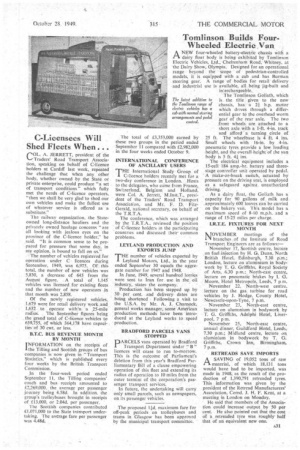C-Licensees Will Shed Fleets When ...
Page 33

If you've noticed an error in this article please click here to report it so we can fix it.
rOL. A. JERRETT, president of the Is-•• Traders' Road Transport Association, speaking on behalf of C-licence holders at Cardiff last week, repeated the challenge that when any other body, whether owned by the State or private enterprise, could produce "a set of transport conditions" which fully met the needs of C-licence operators, "then we shall be very glad to shed our own vehicles and make the fullest use of whatever service is offered as a substitute."
The railway organization, the Stateowned long-distance hauliers and the privately owned haulage concerns "are all looking with jealous eyes on the province of the C-licence holder," he said. "It is common sense to he prepared for pressure that some day, in my opinion, is bound to fall on us."
The number of vehicles registered for operation under C licences during September, 1949, was 6,975. Of this total, the number of new vehicles was 5,830, a decrease of 645 from the August figure. A total of 1.145 vehicles was licensed for existing fleets and the number of new operators in that month was 2,858.
Of, the newly registered vehicles, 1.679 were for retail delivery work and 1.632 to operate within a 25-mile
radius. The September fiuures bring . the grand total of C-licence vehicles to 659.755, of which 364,178 have capacities of 30 cwt. or less.
B.T.C. BUS REVENUE MONTH BY MONTH
I NFORMATION on the receipts of the Tilling and Scottish groups of bus companies is now given in ." Transport Statistics," which is published every four weeks by the British Transport Commission.
Jn the four-week period ended September 11, the Tilling companies' coach and bus receipts amounted to £2,269,000, the average per passenger journey being 4.58d. In addition, the group's trolleybuses brought in receipts of £13.000, or 2.04d. per passenger.
1 he Scottish companies contributed £1,071,000 to the State transport undertaking. The average fare per passenger was 4.48d. The total of £3,353,000 earned by these two groups in the period ended September 11 compared with £2,982,000 in the four weeks ended October 9.
INTERNATIONAL CONFERENCE OF ANCILLARY USERS
THE International Study Group of C-licence holders recently met for a two-day conference in London. Hosts to the delegates, who came from France, Switzerland, Belgium and Holland, were Col. A. Jerrett, M.Inst.T., president of the Traders' Road Transport Association, and Mr. F. D. FitzGerald, national secretary, on behalf of the T.R.T.A.
The conference, which was arranged by the T.R.T.A., reviewed the position of C-licence holders in the participating countries and discussed theircommon problems.
LEYLAND PRODUCTION AND EXPORTS JUMP
THE number of vehicles exported by Leyland Motors, Ltd., in the year ended September 30 equals the aggregate number for 1947 and 1948.
In June, 1949, several hundred lorries were sent to Iran for use in the oil industry, statesthe company.
Production has been stepped up by 30 per cent. and delivery dates are being shortened Following a visit to the U.S.A. by Mr. A. J. Charnock, general works manager, some American production methods have been introduced at the Leyland works to speed production.
BRADFORD PARCELS VANS STOPPED
pARCELS vans operated by Bradford Transport Department under " B " licences will cease to run to-morrow. This is the outcome of Parliament's deletion from this year's Bradford Parliamentary Bill of a clause empowering operation of this fleet and extending its radius of operation to 10 miles from the outer termini of the corporation4s passenger transport services.
In future, the undertaking will carry only small parcels, such as newspapers, on its passenger vehicles.
The proposed lid. maximum fare for off-peak periods on trolleybuses and trams in Glasgow has been approved by the municipal transport committee.




























































































